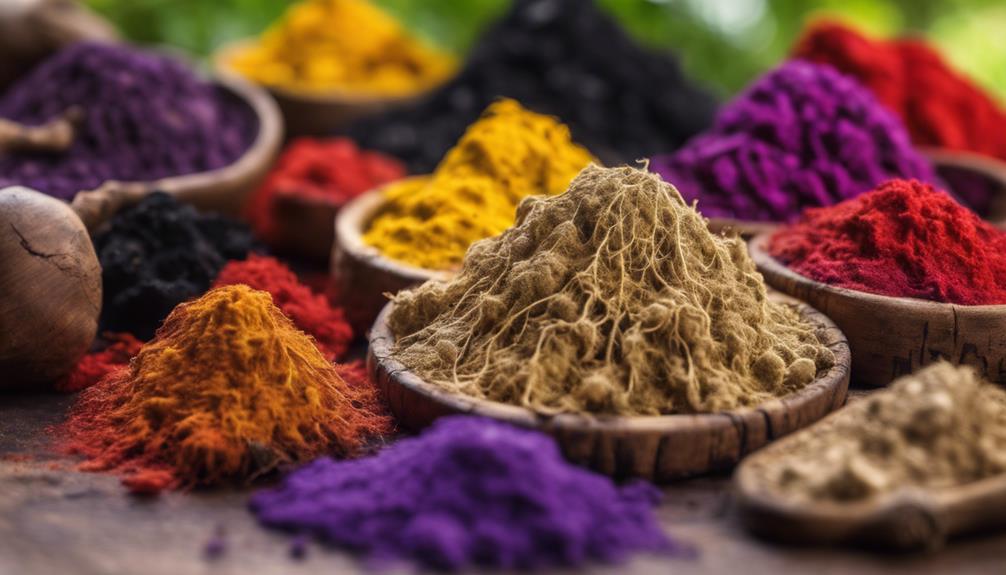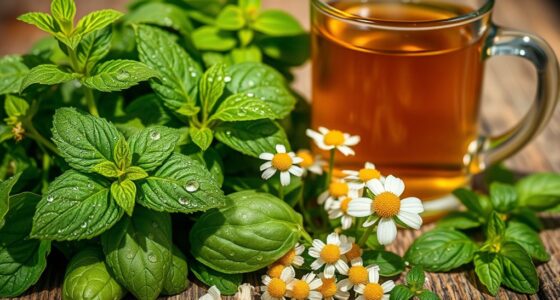When it comes to boosting serotonin levels naturally, herbs like Saint Johns Wort, Lemon Balm, Saffron, and Ashwagandha offer promising benefits. These herbs have properties that can positively influence mood and mental well-being by modulating neurotransmitters like serotonin and dopamine. Additionally, options like Hawthorn, Maca Root, Turmeric, Lavender, and Passionflower provide a holistic approach to supporting mental health. Herbal remedies are effective alternatives to traditional medications, with various consumption forms such as teas, tinctures, and supplements. Exploring these natural boosters can promote a sense of calm and enhance overall mental wellness.
Key Takeaways
- Saint Johns Wort and Saffron boost serotonin levels naturally.
- Ashwagandha, Lemon Balm, and Rhodiola support mood enhancement.
- Maca Root, Lavender, and Passionflower aid mental well-being.
- Turmeric and Hawthorn offer multiple benefits including serotonin support.
- Herbs provide natural serotonin boosts, promoting calm and mental wellness.
Saint Johns Wort
Known for its effectiveness in treating mild to moderate depression and anxiety, St. John's Wort is an herb that contains compounds influencing neurotransmitters like serotonin and dopamine. Serotonin and dopamine play essential roles in regulating mood, emotions, and overall well-being.
St. John's Wort's active components, hypericin, and hyperforin, have been found to impact these neurotransmitters positively, leading to its reputation as a natural antidepressant.
Research suggests that St. John's Wort may help alleviate symptoms of depression and anxiety by modulating serotonin levels in the brain. By inhibiting the reuptake of serotonin, similar to selective serotonin reuptake inhibitors (SSRIs), this herb may enhance mood and emotional stability.
Additionally, the influence on dopamine levels contributes to its calming and mood-enhancing properties, making it a popular choice for individuals seeking natural remedies for mental health concerns.
However, it's crucial to note that St. John's Wort can interact with certain medications, emphasizing the importance of consulting healthcare providers before incorporating it into a treatment regimen.
Lemon Balm

Lemon balm, a herb recognized for its calming properties, offers a range of benefits for those seeking to alleviate anxiety-related symptoms. Rich in compounds that enhance brain signaling molecules like GABA, this herb aids in calming nerves and fostering relaxation.
Often utilized in aromatherapy, lemon balm is esteemed for its mood-improving and stress-relieving qualities, cultivating a serene and peaceful atmosphere.
Lemon Balm Benefits
With its reputation for promoting relaxation and reducing anxiety, Lemon Balm offers an array of emotional well-being benefits. This herb, commonly used in herbal medicine, has been shown to reduce stress and improve mood effectively.
Here are some key benefits of Lemon Balm:
- Calming Properties: Lemon balm, also known as Melissa officinalis, is renowned for its calming and relaxing effects on the mind and body.
- Anxiety Reduction: Traditionally used to alleviate symptoms related to anxiety, Lemon Balm can help individuals feel more at ease and less stressed.
- Mood Enhancement: Research indicates that Lemon Balm contains compounds that can enhance mood and contribute to a sense of overall well-being.
Incorporating Lemon Balm into your daily routine, such as through teas or aromatherapy, may provide a natural way to support emotional wellness.
Serotonin-Boosting Properties
Research suggests that the serotonin-boosting properties of Lemon Balm contribute to its reputation for promoting emotional well-being. Lemon balm is recognized for its ability to enhance mood and reduce symptoms of anxiety by influencing neurotransmitters like serotonin. This herb contains compounds that increase GABA levels, a neurotransmitter linked to feelings of relaxation and stress reduction. By boosting GABA, lemon balm aids in calming the mind and alleviating anxiety-related symptoms.
Lemon balm's impact on serotonin and dopamine levels further supports its role in promoting emotional well-being and mental calmness. Additionally, lemon balm is commonly used in aromatherapy to improve mood and reduce feelings of anxiety, making it a versatile herb for addressing both emotional and physical discomfort. Its calming and relaxing properties extend beyond mood enhancement, as lemon balm is also effective in relieving digestive spasms, offering a holistic approach to well-being.
Usage and Precautions
Exploring the appropriate usage and precautions for incorporating Lemon Balm into one's routine is important for maximizing its potential benefits and ensuring safety. When considering the use of this herb in herbal supplements, it's vital to keep the following points in mind:
- Lemon Balm is known for its calming properties and may help reduce anxiety-related symptoms through its interaction with GABA receptors in the brain.
- Consultation with a healthcare provider is recommended before using Lemon Balm, particularly if you're on medications or pregnant, to avoid any potential interactions or adverse effects.
- Precautions should be taken when using Lemon Balm to alleviate digestive discomfort, as excessive consumption may lead to unwanted side effects such as nausea or abdominal pain.
Being mindful of these guidelines can help individuals make informed decisions regarding the incorporation of Lemon Balm into their wellness routines, ensuring a safe and effective experience with this herbal remedy.
Saffron

Saffron, a herb renowned for its mood-enhancing properties, is known to boost serotonin levels in the brain through compounds like crocin and safranal.
Studies have shown its efficacy in alleviating mild to moderate depressive symptoms by increasing serotonin and dopamine levels.
Incorporating saffron into your diet or as a supplement may offer benefits for emotional well-being and reducing symptoms associated with anxiety.
Saffron's Serotonin Benefits
How does saffron contribute to boosting serotonin levels in the brain?
Saffron, a renowned herb for its mood-enhancing properties, plays an essential role in elevating serotonin levels, thereby positively impacting mental health.
Here are some key points to keep in mind:
- Safranal Influence: The active compound safranal found in saffron plays a significant role in enhancing serotonin levels in the brain, contributing to a sense of well-being and emotional stability.
- Mental Health Benefits: Studies suggest that saffron may aid in alleviating symptoms of mild to moderate depression by modulating serotonin and dopamine levels, highlighting its potential as a natural remedy for mental health conditions.
- Traditional Usage: Saffron has a long history in herbal medicine for improving mood, reducing anxiety, and fostering emotional wellness, making it a valuable resource for those seeking natural serotonin support.
Incorporating saffron into your daily routine, either through culinary use or supplementation, could potentially enhance serotonin production and promote overall mental wellness.
Usage and Dosage Recommendations
To maximize the benefits of saffron in boosting serotonin levels, it is important to understand the recommended usage and dosage recommendations for this herb. When considering saffron supplementation, it is advised to adhere to a daily dosage of around 30 mg for mood enhancement purposes. This dosage has been linked to potential improvements in serotonin levels, which can aid in managing symptoms of mild to moderate depression. Before incorporating saffron into your daily routine, especially if you are currently taking other medications, consulting a healthcare provider is strongly recommended to guarantee safety and efficacy.
| Dosage | Effects |
|---|---|
| 30 mg daily | Mood enhancement |
| Potential serotonin level increase | |
| Management of mild to moderate depression |
Saffron's serotonin-boosting effects can be attributed to its active compounds, such as crocin and safranal, which play an important role in enhancing mood and overall well-being.
Ashwagandha

Known for its adaptogenic properties, Ashwagandha, also referred to as Withania somnifera, is a herb widely utilized in traditional Ayurvedic medicine. This powerful herb offers a range of benefits for mental well-being, including the modulation of neurotransmitters like serotonin and dopamine in the brain. Here are three key points to keep in mind about Ashwagandha:
- Stress Reduction: Ashwagandha is known for its ability to reduce stress and anxiety levels, making it a popular choice for those seeking natural remedies to promote relaxation.
- Mood Support: By potentially influencing neurotransmitters such as serotonin and dopamine, Ashwagandha may help alleviate symptoms of depression and enhance overall mood.
- Cognitive Enhancement: Research suggests that Ashwagandha can improve cognitive function, boost energy levels, and support mental clarity, making it a valuable herb for those looking to enhance their focus and productivity.
Before incorporating Ashwagandha into your routine, consulting with a healthcare provider is advisable, especially if you're taking medications or have specific health concerns.
Hawthorn

Hawthorn is a herb with serotonin-boosting properties that have been linked to supporting heart health and circulation.
Known for its rich flavonoid content, hawthorn offers antioxidant benefits and a calming effect on the nervous system.
This versatile herb is used both in culinary dishes and traditional medicine practices, making it a valuable addition to one's wellness routine.
Serotonin-Boosting Properties
With its serotonin-boosting properties, Hawthorn supports overall emotional well-being and offers various health benefits. Hawthorn isn't only known for its ability to enhance serotonin levels, but it also plays an important role in supporting cognitive function.
Here are some key aspects of Hawthorn's serotonin-boosting properties:
- Emotional Well-Being: Hawthorn aids in improving emotional well-being by boosting serotonin levels, which can help reduce symptoms of anxiety and depression.
- Heart Health: This herb is beneficial for the heart, enhancing coronary circulation and providing a tonic effect on the heart, which contributes to overall cardiovascular health.
- Cognitive Function: Hawthorn's serotonin-boosting properties extend to cognitive function, potentially improving mental clarity and focus.
Incorporating Hawthorn into your routine may offer a natural way to support emotional well-being and overall health. However, it's important to consult a healthcare provider before beginning any new herbal regimen, especially if you're currently taking medications.
Culinary and Medicinal Uses
One popular way to incorporate hawthorn into both culinary and medicinal practices is by infusing it into teas or tinctures for its health benefits. Hawthorn, known for its culinary uses in jams, jellies, and wines, also boasts significant medicinal properties.
It's a natural remedy often utilized to support heart health, improve circulation, and regulate blood pressure. The herb is praised for its ability to enhance coronary circulation and act as a tonic for the heart. Hawthorn's richness in antioxidants and flavonoids contributes to its wide array of health benefits.
When considering hawthorn for its medicinal properties, it's essential to consult a healthcare provider, especially if you have existing health conditions or are taking medications. By incorporating hawthorn into your diet or as a supplement, you can potentially benefit from its positive impact on serotonin levels and overall well-being.
Rhodiola

Rhodiola, renowned for its adaptogenic properties, is a powerful herb known to alleviate stress, anxiety, and fatigue. This herb has a range of benefits that can boost serotonin levels and improve mental health.
- Enhances serotonin and dopamine levels in the brain, promoting emotional well-being.
- Supports healthy aging, energy levels, and overall mental clarity.
- Improves mood, cognitive function, and resilience to physical and mental stress.
Rhodiola's ability to modulate neurotransmitters like serotonin and dopamine makes it a valuable natural remedy for those seeking to enhance their emotional well-being.
By reducing stress and anxiety, it can contribute to a more balanced mental state and increased resilience to life's challenges.
However, it's essential to exercise caution when using Rhodiola alongside certain medications, as interactions may occur.
Consulting with a healthcare provider before incorporating this herb into your routine is advisable to ensure its safe and effective use.
Maca Root

Moving on to Maca Root, this Peruvian herb is known for its rich nutrient content and its potential to enhance energy levels and mood regulation. Maca root is a powerhouse of essential nutrients such as vitamin C, copper, and iron. Apart from boosting energy levels and stamina, this herb plays an important role in hormone regulation, mood improvement, and cognitive support. With its adaptogenic properties, Maca root is frequently utilized to combat stress and promote relaxation.
One of the notable benefits of Maca root is its ability to potentially boost serotonin production. Serotonin, often referred to as the 'feel-good' neurotransmitter, plays a key role in mood regulation and overall mental health. By enhancing serotonin levels, Maca root may contribute to a balanced mood and improved mental well-being.
Incorporating Maca root into one's diet or supplement regimen could offer a natural way to support mental health and emotional stability.
Turmeric

Renowned for its anti-inflammatory properties and potential impact on serotonin levels, Turmeric stands out as a popular herb valued for its mood-enhancing benefits.
The active compound in turmeric, Curcumin, plays an essential role in potentially increasing serotonin production in the brain, which can lead to improved mood. Research indicates that turmeric acts as a natural antidepressant by enhancing serotonin neurotransmission, offering a natural way to support mental well-being.
Turmeric is a versatile herb that can be easily incorporated into various dishes or taken as a supplement, making it convenient to include in your daily routine.
The potential of turmeric to boost serotonin levels in the brain highlights its significance in promoting emotional balance and overall mental health.
Including turmeric in your diet may provide a natural way to support serotonin balance, potentially contributing to a positive impact on mood and well-being.
Lavender

Frequently valued for its calming and relaxing properties, Lavender is an herb known for its ability to reduce anxiety and stress. The soothing aroma of lavender is widely recognized for its therapeutic benefits in promoting relaxation and improving mood through aromatherapy.
Studies have shown that lavender exhibits anxiolytic effects, effectively reducing symptoms of anxiety and enhancing mental well-being. Additionally, research suggests that lavender may aid in improving sleep quality and alleviating symptoms of insomnia.
Lavender essential oil is commonly utilized in aromatherapy practices to combat stress, anxiety, and foster overall emotional well-being. The application of lavender in aromatherapy is a popular method to harness its anxiety-reducing properties and promote a sense of tranquility.
With its proven calming effects on the mind and body, lavender stands out as a natural remedy for those seeking relief from the burdens of anxiety and stress.
Passionflower

Known for its calming effects on the nervous system, passionflower is an herb that contains compounds believed to increase serotonin levels in the brain. This natural remedy is commonly used to alleviate symptoms of anxiety disorders, such as generalized anxiety, social anxiety, and panic attacks.
Passionflower promotes relaxation by boosting serotonin levels, which can help reduce feelings of worry and stress.
Individuals dealing with insomnia often turn to passionflower to improve sleep quality and duration.
Research suggests that passionflower may aid in balancing mood and reducing symptoms of anxiety disorders, making it a popular choice for those seeking natural alternatives to traditional medications.
Passionflower is available in various forms, including teas, tinctures, and supplements, making it convenient for individuals to incorporate into their daily routine. Whether consumed alone or in combination with other herbs, passionflower offers a natural way to support mental well-being and promote a sense of calm.
Frequently Asked Questions
Which Herb Increases Serotonin?
It is established which herb increases serotonin. St. John's Wort is one option that can boost serotonin levels in the brain, aiding mood regulation. Rhodiola, Saffron, Lemon Balm, and Lavender are other natural choices known for enhancing serotonin production and improving emotional well-being.
What Naturally Boosts Serotonin?
Consulting a healthcare provider is essential for safe use when boosting serotonin naturally with herbs like St. John's Wort, lavender, and saffron. These mood-enhancing plants contain compounds that influence neurotransmitters, supporting emotional well-being.
What Plants Are High in Serotonin?
We have explored plants that naturally support serotonin production like bananas, spirulina, cacao, maca root, and turmeric. These options offer different ways to boost serotonin levels in the body, promoting mood enhancement and overall well-being.
What Vitamin Increases Serotonin?
Let's shed light on what boosts serotonin naturally. Vitamin D steps up serotonin levels by aiding its brain production. Sunlight fuels vitamin D, supporting serotonin synthesis. Maintain balance with vitamin D-rich foods or supplements.
Conclusion
To sum up, integrating herbs high in serotonin into your diet can offer a natural boost to your mood and overall well-being.
According to a study published in the Journal of Psychopharmacology, individuals who regularly consume serotonin-boosting herbs experienced a significant decrease in symptoms of anxiety and depression.
With a variety of options available, from Saint Johns Wort to Turmeric, there are plenty of natural ways to enhance your serotonin levels and promote a healthier mental state.










